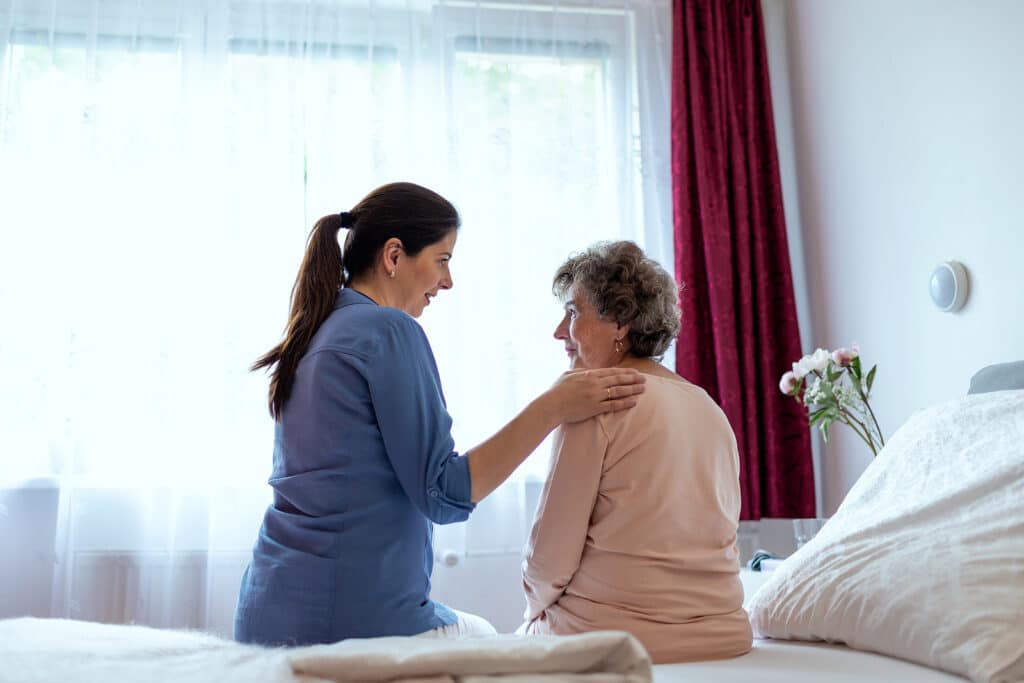Personal Care at Home
Let's Get Started!
Get Immediate Help on Info & Pricing
Maintaining Independence at Home with Personal Care Services
For many seniors, receiving personal care assistance at home is essential to continue living independently while managing age-related limitations. Personal care services provide hands-on help with intimate daily activities that support seniors' health, hygiene and quality of life. Understanding what personal care involves and how it differs from companion services empowers families to make the best care decisions.
What are Personal Care Services at Home?
Personal care consists of non-medical in-home services assisting seniors with personal hygiene, mobility and activities of daily living. These hands-on services include:
- Bathing and showering
- Grooming and oral hygiene
- Dressing and undressing
- Toileting and incontinence care
- Transferring and mobility
- Eating and feeding
- Assistance with prosthetics and assistive devices
Personable and patient caregivers provide this intimate assistance respectfully while encouraging independence. Their support enables seniors to enjoy cleanliness, health and dignity each day.
Who Can Benefit from Personal Care?
Seniors experiencing decreased mobility, flexibility or stamina can benefit greatly from personal care. Those managing chronic conditions like arthritis or recovering from surgery may require more hands-on help temporarily or long term. Personal care provides necessary assistance when seniors have difficulties with:
- Bathing and dressing independently
- Standing for grooming and hygiene
- Moving between bed, chair and bathroom
- Using the toilet or managing incontinence
- Putting on prosthetics and assistive devices
- Preparing meals and feeding themselves
Caregivers collaborate with seniors and their capabilities. Their gentle support fosters confidence and comfort performing daily routines.
Services Provided by Personal Caregivers
Beyond direct personal care, caregivers also provide these assisted living services:
Medication Reminders – They prompt seniors to take medications on schedule and assist as needed.
Ambulation Assistance – Caregivers ensure seniors' safety when moving about the home and provide mobility aids.
Transportation – They accompany seniors to medical appointments and errands.
Meal Preparation – Caregivers plan and cook meals meeting dietary restrictions.
Light Housekeeping – They handle chores like laundry to maintain a clean home environment.
Incidental Nursing – Within their scope of practice, they can assist with medical tasks like changing bandages.
This comprehensive assistance enables seniors to feel healthy and well cared for.


How Personal Care Differs from Companion Services
Companion care provides oversight, engagement and emotional support. But it does not involve hands-on help with personal hygiene and intimate daily tasks. Key differences include:
Physical Assistance – Personal care involves bathing, dressing, grooming and toileting assistance. Companion care does not.
Medical Needs – Personal caregivers are trained for medication reminders, wound care, physical therapy and feeding assistance. Companions focus on non-medical tasks.
Activities – Companions prioritize socialization and leisure activities matched to interests. Personal care focuses on health-related daily living tasks.
Specialization – Personal caregivers receive more specialized training to provide physical care safely. Companion skills focus on providing engaging company and conversation.
When considering in-home senior care, personal care and companion services fulfill distinct but complementary roles in supporting wellbeing.
Maintaining Health, Safety and Dignity
Personal care enables seniors to feel their best while remaining comfortably at home. Key benefits include:
Independence – With appropriate assistance, seniors can function more independently which boosts confidence and self-esteem.
Cleanliness – Regular bathing and oral hygiene contributes to health and prevents infection.
Mobility – Caregivers provide stability and fall prevention when moving about.
Nutrition – Caregivers prepare nutritious meals meeting dietary restrictions.
Dignity – Respectful, patient assistance preserves seniors' dignity.
Recovery – Caregivers provide rehabilitation assistance and medical oversight.
With compassionate support suited to their needs, seniors can happily age at home and feel cared for.
Offering Family Caregivers Respite
Hands-on personal care can be demanding for family members to manage alone. Having trained personal caregivers assist provides periodic respite so families can recharge.
Knowing their loved one is well cared for, family members can take a break to:
- Rejuvenate from caregiving demands
- Focus on their own health and wellness
- Attend to household and family responsibilities
- Avoid burnout through regular breaks
- Return to caregiving tasks feeling renewed
Even a few hours of respite provides time to relax and reset. It also strengthens families' ability to care for loved ones long term.
Selecting a Personal Care Provider
When selecting an agency, look for one demonstrating:
- Thorough training on assisted daily living tasks and senior health
- Specialized skills in areas like dementia, mobility assistance, nutrition
- Rigorous caregiver screening and background checks
- Customized care planning based on capabilities and needs
- 24/7 availability for oversight and emergency response
- Caregiver matching based on personality and interests
The ideal agency will collaborate with families and doctors to craft care plans supporting seniors' health, safety and independence. With the right assistance, seniors can happily age at home and feel at ease.
